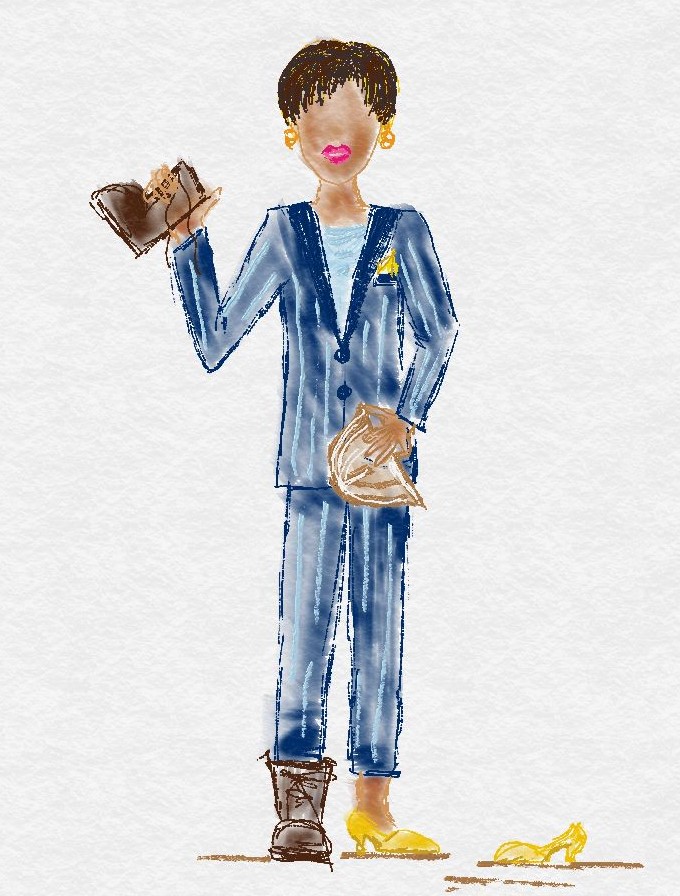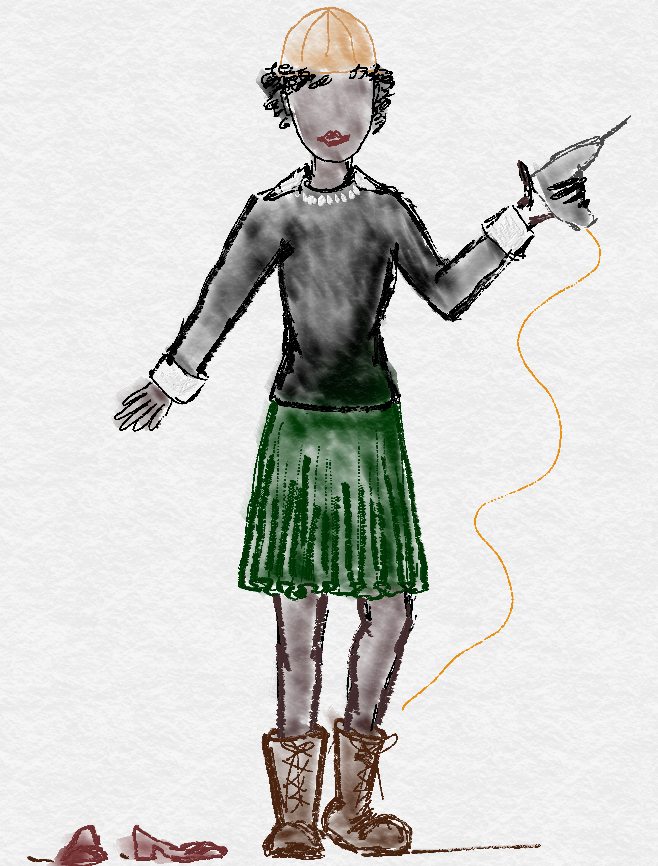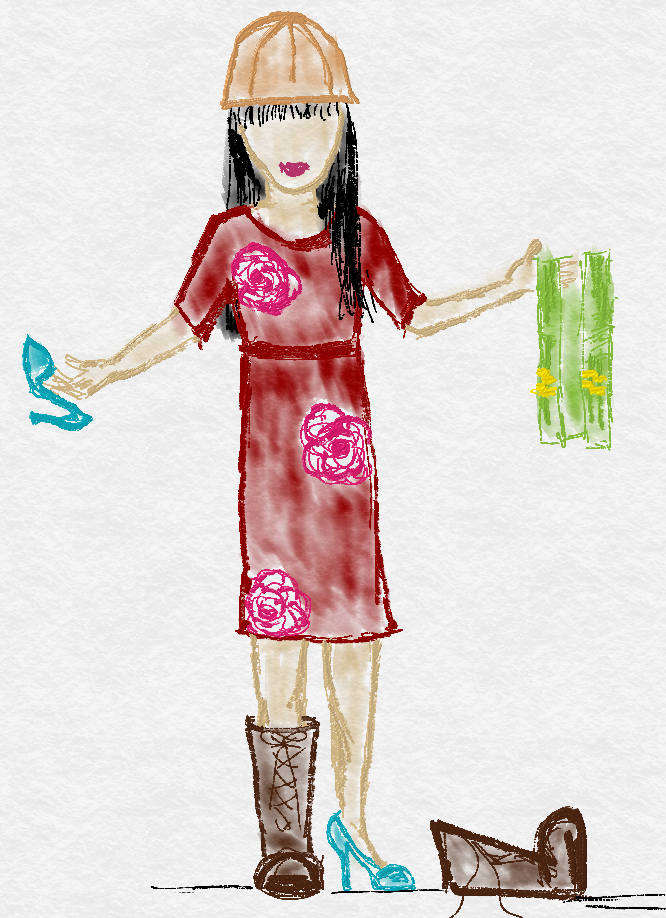Happiness
Civil Wars
The Casualties Are Higher When It’s Personal
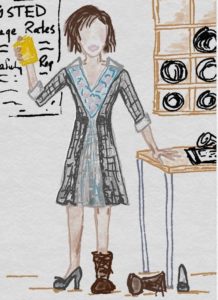
It didn’t take the #metoo movement for most of us to be familiar with being undervalued or disrespected or ignored at work or in school. Even our youngest millennials who work in progressive companies with open-minded colleagues have run into ugliness at some point. The trouble may have come from a backwards guy on a jobsite spouting obscene suggestions while he ignored your engineering evaluation of the problem with his soil nail wall. You may have lost a promotion to a guy with less experience but who the boss felt more comfortable sending out to construction sites. Or the issue may have been more subtle; a manager who professed to care about your career but who kept assigning difficult projects to others in order to “give you less stress.”
As we wade through these swine-infested waters, the implication is that all of our problems are work issues. The offenders are people from families that aren’t yours. The misogynists are other women’s husbands (bless their hearts). And when you leave the offensive situation at work, you get to go home to sympathetic people who love you and value you for everything wonderful that you are.
Yes, in the candy-canes-and-teddy-bears world in my head this is true. We all have supportive, understanding partners and close-knit, warm families. Diane Keaton will be playing your mom in the movie about how you took on the unequal power structure at your company and won, and Kelly Clarkson will do the soundtrack.
How often is this really true? Using the analytical side of our personalities, does it make statistical sense that all of us fabulous women in our field would have enlightened partners and families? Not a chance. We have to be realistic about the fact that our career choices likely will make waves for us personally as well as professionally. And it’s doubtful that there’s an HR office in your house to sort it out. So solving your inequality problems with people you are tied to legally and genetically probably will be much more complicated than taking care of your work issues. And much more painful.
I worked with a woman years ago whose father was an earthwork contractor. He had raised his two sons to work in the family business, and neither had ended up working with him. On the other hand, his daughter had spent her childhood begging to learn how to operate a backhoe, asking questions about grade stakes and stockpiles. He told her that girls had no place in construction. She tried for years, only to be rebuffed. Finally out of high school, she chose to go to engineering school, hoping for a “backdoor” into her father’s world. Sadly, he never accepted her. His disapproval and lack of pride in his daughter’s accomplishments led to bitterness and anger in her. When I met her she was in her late twenties, and her bitterness toward her father subconsciously controlled most of her actions. She slept with men of whom she knew he would disapprove; she slanted all of her evaluations on jobsites against the interests of the contractors; and she measured every career victory in terms of what her father was missing. It was tragic.
Could she have changed her father’s longstanding opinions if she had tried a different approach? Could she have proven to him through actions that his outdated beliefs were wrong? We’ll never know. They stopped speaking to each other years ago.
Many counselors and psychologists will tell you that insecurities are magnified a thousand fold with your “family of origin.” This sensitivity can make rectifying a bad situation seem insurmountable. The emotions involved can cloud reason and douse any flame of energy for being patient with ingrained prejudices and longstanding beliefs. With family, a woman must have a true desire to change her relatives’ beliefs and behaviors. And she must have patience above all. Because she is not just redefining another person’s beliefs, she is restructuring the family unit. Making progress may not always be possible, and it will be arduous when it does occur.
A relationship with a partner is a completely different issue. A partner is someone who has been chosen. The implication is that the chosen person loves you and wants what’s best for you, no matter what. Even if such a person would have outdated beliefs, they would be easy to convert to a more progressive mindset because they think you’re fabulous.
If only it were that simple. As Annie Schmelzer said so brilliantly in this post, most guys don’t go around with a T-shirt that says they’re insecure sexists who will try to undermine you the minute they feel threatened. Wait – threatened? If you love a man and he loves you, why should he ever feel threatened? If you really love each other (and you didn’t get together just because all of your other friends were getting married and it was “time”), you both want nothing more than the health and happiness of the other person. Anything less isn’t real love. But close-but-no-cigar love often comes disguised as real love. Unfortunately, the voids usually don’t appear until it’s too complicated to just walk away.
My mistakes in this area have been spectacular, the product of my leap-before-I-look personality and my perpetual optimism. (Really? That alcoholic who flirts with me every time I come out on site doesn’t respect me? But he said he likes me…) My longtime boyfriend in college was very supportive of my engineering career until I ran into a problem with a guy on my second co-op job in school. When I told my boyfriend that I had brought it up to my boss, he said, “Hey – I didn’t sign up for any feminist crusade.” A guy had just been extremely disrespectful to me, and all my boyfriend could think about was not being involved in a conflict. And I was too stupid to get out of the relationship at the time.
Even though I broke up with that guy later, my obliviousness continued. Probably the most painful experience I had was when I got married to a man who professed to think that my job was “cool” and that he was proud of me. I had always thought that the best part of marriage was sharing yourself with another person, not being afraid that the other person will judge you or use what you share against you. Both of you are supposed to always be on the other’s side. But what I found is that every time I did well at work, my husband would use something I had told him against me. If I solved a dispute on a construction site, he would remind me that I had stomach ulcers and was “weak.” If I gained a new client, he would work into conversation that I get my rights and my lefts mixed up often. If someone else complimented me on my work at a party, he would tell the crowd that I told him how nervous I was when I had to deal with a particular client. I didn’t recognize the pattern – or the motive – at first, but as time went on his comments became meaner and his acknowledgements of anything I did well fewer and far between. Needless to say, he loved some idea of me, but not the actual me. Not the me who wades through mud in deep sinkholes. Not the me who changes her own tires and doesn’t automatically ask a man to perform tough jobs. And being with someone who didn’t want me to be the best person I could, whether as a muddy engineer or in a more traditional role, wasn’t healthy.
As difficult as our professional problems with gender inequality may be, solving the same problems in our personal lives is far more complicated and burdensome. The emotions involved can distort our perceptions of what is best for us and distract us from the truth in our lives. There is no handbook, no company policy, no legal recourse for being narrow-minded in a personal relationship. But we have our sisterhood in this, too, and we owe it to other women to support them when they need us, whether the problem is personal or professional. People we love and who allege to love us should love us for who we are, not who they want us to be. And just like in our professional lives, we owe it to ourselves not to settle for less.
Happy Anniversary Us!
Where’s the Smash Cake?

A little over a year ago we decided to do something crazy, and Underpinnings was hatched. We have built up a fabulous community, and we hear every day from one of our “skirts in dirt” how much they enjoy reading others’ stories and how much it helps them to know they’re not alone in the universe.
We deal with heavy subjects on a weekly basis, and we hope that we have helped make some progress in the world. But celebrations are not the time for serious conversations and heavy discussions. So we want to have some fun.
The flip side of the trouble involved with being a woman in a male-dominated field is the pure entertainment value. Most of us have been in some ludicrous/ridiculous/hilarious situation that stemmed from the fact that we were the only skirt at work. And not only is laughing good, but it’s important to recognize the positive side of our unique situations.
Underpinnings is celebrating our first anniversary with a contest. Yes – a contest! Below you will find a funny story from each of us. We are asking you to submit your favorite funny story from your life as a pink dot in a field of blue. The winner will receive a fabulous basket full of inspiring, weird, funny, sparkly gifts worthy of the effort we all make.
Entries are due by midnight, December 15th. A winner will be announced on Wednesday, December 20th. You may ask us to remain anonymous, if you would like, but we hope everyone feels like this is a safe space. Don’t worry about whether or not you write well – that’s not the point. We’ll clean up any little issues if necessary before we broadcast your hilarity to the world. E-mail your entry to underpinningsgeo@gmail.com. We can’t wait to read them. In the meantime, here are some examples.
Helen
My story has less to do with being a woman and more to do with just being me and sometimes overthinking things a bit too much. Recently, I was headed down to the Washington D.C. office of my company for the first time. I successfully navigated Amtrak from Wilmington to Union station in D.C. as I have often done before, bought a Metro card and located the appropriate line, and got off to walk several blocks to the office. I had worn comfy slip-on sneakers for travel and planned to change into heels when I arrived. I also planned to slip into a bathroom to apply lipstick and make myself presentable. When I entered the building I found it was the type to have a doorperson where you sign in as a guest and they swipe their keycard in the elevator and press the floor number for you. I felt it would have been quite awkward to avail myself of the bench in the lobby to change shoes and freshen up, so I mentally adjusted my plan to find the bathroom first when I arrived on the floor.
Having spent the last 15 years of my career in offices in suburban PA, I had forgotten that city offices often have separate locked bathrooms with a key available as needed to the office tenants on each floor. I stepped off the elevator, found the restroom, and got the stark reminder. So I scanned around for other options and found the next best thing- a door leading to the stairwell.
In the stairwell I completed my shoe change and used my cell phone as a mirror to fix my makeup. Satisfied, I gathered my briefcase and purse and turned to exit. That’s when the cold reality hit- the door handle wouldn’t move. I was locked in! Noooooo! What were my options? Continue down many flights of stairs back to the lobby, but what if it ended in an emergency exit or something? Climb up or down to see if all the floors were locked? Likely futile, and then I would have to get back on the elevator again which probably wouldn’t let me select the floor I needed. So, I had to bite the bullet and call the office to have someone rescue me. The office manager answered and failed to suppress her astonishment that I was locked in the stairwell. She came to my aid and reassured me that no one in the office was a stickler for dress code. I happened to glance down at her feet- she was wearing rain galoshes.
Peggy
I spent about ten years doing construction-phase engineering for several hundred transmission structure foundations. Often the jobsites were in very remote locations that were only accessible via old logging roads or park service paths or yellow brick roads to magical wardrobes in vanishing train stations. Even more often the construction crews resembled the Pirates of the Caribbean crew with corresponding charm and social skills.
One particular project was on a steep peak east of Morehead, Kentucky, three hours from my house. Concrete was an hour away and placement typically involved getting the truck situated in some non-OSHA-approved arrangement. Construction started at the beginning of December during a year in which Kentucky had experienced more than its annual snowfall total by December 5th. None of the concrete truck drivers wanted to come to the site, so dispatch often “lost” the order for the day. Days were long and made even longer by the fact that my husband (at the time) had decided it was more dangerous for me to stay in a motel in eastern Kentucky than to spend six hours on the road every day in addition to 10 hours on the site.
The crew on this site was nice and minimally endowed with cartoon-worthy facial features. Not a single guy wore an eye patch. Three of them were under 25 and quite taken with having a “girl” on the site. One gentleman in particular appeared to be smitten with me, an amusing fact considering that I usually was covered in mud and bleeding from some random tie wire/rebar injury.
The third week of the project the amorous worker became more aggressively charming. I made frequent references to my husband, to no avail. He was never touchy or obnoxious, he just flirted a lot and let me know how much he admired my intelligence, my boots, (yes, boots), my understanding of different kinds of mud, and my ability to drive in the snow. Our last concrete pour was scheduled for that Friday, so I figured we would finish up and that would be that.
The last day of the job, more snow blew in. By noon, we had several inches on the ground and visibility was low. My admirer was unusually distant, but I figured he was just trying to get his work done amidst the bad weather. Oddly enough, the superintendent on the job was not rushing at all and kept backing the concrete plant off. “It’s Friday!” I kept saying. “If we don’t pour soon the drivers will all have their 40 in and we’ll get no concrete.” Nothing. The afternoon crept on and the only person seeming to be experiencing any anxiety was my “boyfriend.”
Finally, about 3:00, with snow driving in my face, I turned around when I heard an odd noise. There on one knee was the amorous crew member. He had taken the pine tree air freshener from his truck and folded it into the shape of a rose, and he was holding it out to me and serenading me with a country song about soul mates. (The image is still emblazoned in my brain). Stunned, I said, “Oh, sweetie, that’s lovely. But I’m married. And more importantly, we have to get concrete in the ground.” He stood up, gave me the “rose,” and said, “Well, you know where to find me.” Still stunned, I turned around to find the superintendent there watching. I couldn’t think of anything intelligent to say, so I just asked why we still hadn’t poured concrete. He got a big grin on his face and said, “That boy has been mooning at you for three weeks. He thought if concrete was late today you would have to stay overnight and he could make his case. I told him I would play along as long as I could, but we’re starting to get some cave-ins, so I gave him a deadline. I’m all about true love, but I’m not digging these holes again.”
We finished pouring concrete and I went home. But pine tree air fresheners still make me smile.
Thankful
Thanks Are Not Relative

Here at Underpinnings, we strive to figure out how to level the playing field for women in the deep foundations industry and in other male-dominated fields. We try to listen to the women in our professional and personal communities so that we can understand the many facets of the obstacles women face in our positions. We work to address the situations we call problems.
But down the street from us, there are women who haven’t eaten today. In other countries, women are not allowed to go to school. We protest catcalls at the same time women are being raped in the name of military superiority. While we complain about juggling the busy schedules of our spouses and kids, women in war zones are watching their families die. Yes, we have problems, but we have first-world problems.
It might seem logical to feel guilty and ashamed for complaining when we live in such fortunate circumstances. On the contrary, we should be thankful. We should view our success and progress as the front end of the movement. Instead of settling for the flawed conditions in which we work, rationalizing that it could be so much worse, we should continue to move forward. We women are a unit, and the more ground we cover, the farther forward we pull the whole group. By improving our “station,” we increase the power of our outrage over the plight of women elsewhere in the world. The more we push the idea that it’s not okay to demean or limit women anywhere, the better the chances are that we can prevent it from happening everywhere.
This week we are thankful that we have the right to have a meaningful discussion about our place in the world. We are grateful for our opportunities. And we appreciate the power we have to make things better in the future.
We also are thankful for our Underpinnings community. Next week, we will have our one-year anniversary, and we’re going to celebrate with something new and fun. No, it’s not wrong to be happy and have fun when others are not. You can rest assured they would be happy if they had the chance. We can’t let any of those chances slip away, because our happiness and our hope are the sparks that fire our lives.
Happy Thanksgiving from the Underpinnings Team!
Do Be Do Be Do
Was Frank Singing About Balance?
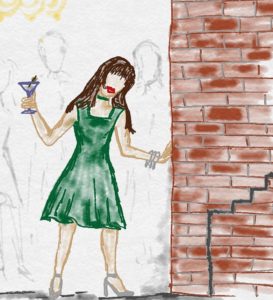
Are you familiar with the 50/50 theory? This concept might be considered part of today’s earthy crunchy “mindfulness” movement, a nebulous buzz word-y school of thought that encompasses everything from recycling to snacking. However, the 50/50 theory seems to have some actual merit, so I’m kicking it out of the 2-inch thick mindfulness puddle and giving it credit for some real depth.
According to the 50/50 plan, 50% of a person’s time should be spent being, and 50% should be spent doing. Okay, yes – this calls for a clarification. Aren’t we “being” all of the time? Doesn’t the entire day require “doing?”
Simply put, being means experiencing life and doing indicates proactively engaging in a pursuit. For example, spending the morning preparing food for 40 and setting up a pregame tailgate would be considered doing. Enjoying the football game and a few cocktails would be labeled being. Another example would be a professional conference. Participating in a discussion reviewing upcoming changes to a federal guideline would be doing – enjoying cocktail hour with your professional posse would qualify as being.
The originators of this philosophy might have a stricter interpretation of being than given in this example. Meditation and reflection could be interpreted as the only true form of “being.” But spending 50% of our time meditating would be unrealistic for most of us, so I’m not going to address this concept in such extreme terms.
So why is this pertinent, and does it have any merit? After thinking about it for a few weeks, I finally decided that this idea might be brilliant. In fact, it might be a rather simple start to figuring out how to balance the many complications that we all deal with in life.
My initial reaction to the plan was absolute resistance. Only 50% doing? Are you kidding me? There is no part of my personality that doesn’t say, “Let’s get this done!” My zodiac sign is Aries, for heaven’s sake – there is very little about a charging ram that involves just sitting back and experiencing life. And my to-do list is 4.6 miles long. Who has time to just be?
On the other hand, I kept thinking about that football game example. I do love to plan all week with my BFF for our tailgate menu, and I can’t imagine not making gallons of bourbon punch and figuring out the best way to serve potato salad without giving half the crowd salmonella. But the experience would be incomplete if I didn’t spend the three hours after the tailgate watching the game and chatting with family, friends, and random opposing fans. Sure, at some point during the game I usually offer to use the rest of my college athletic eligibility and play offensive line (because NO ONE IS BLOCKING), but I don’t really mean it. That three hours of non-participation feeds my soul, and the fact that I’m NOT actively in charge of the outcome of the game is one of the reasons I enjoy it so much.
We women spend a lot of time trying to figure out how to balance the long list of work/family/shoe shopping demands on our schedules. There are bridge foundations to design, shoring systems to inspect, bids to complete, and groundwater conditions to evaluate. There are also appointments for the kids at the pediatrician and the dentist, dinner to cook, groceries to buy, and the house to clean. (Hahahahaha – just kidding on that last one. But we’ll pretend). None of these things smack of “being.” And none of them are exactly optional. For some reason those clients insist on having their projects completed this year, and the kids want to eat EVERY DAY.
But what about the rest of the list? What about that extra white paper you promised to finish for a professional association committee? What about the Pan-Asian cooking class you signed up for to make your dinner offerings more interesting? What about the American Girl reading group you enrolled your daughter in (that’s 75 minutes away from home) because you were afraid Girl Scouts and soccer weren’t enough and because some of the other girls in her class were going?
Many of our “required” activities are prompted by our fear that we’re not enough. We’re working, so we must be shortchanging our kids, so we must make up for it by enriching their poor abandoned lives. We have families, so our careers must be suffering, so we must make up for it by engaging in more professional activities to prove that we’re still relevant. (What about the shoes? Why does no one ever worry about the poor shoes that are being neglected because of work and family demands?) Let’s call it what it is, the G word. Guilt. Most of us are so accustomed to carting guilt around that we would have phantom guilt, much like phantom pain with a severed limb, if it weren’t there.
The 50/50 plan says that increasing our efforts doesn’t necessarily put us ahead. It says that we’re losing something in all of that overcompensating. Maybe our daughters would benefit more from sitting on the couch with us gabbing about where we would go if we had a ticket to fly anywhere in the world rather than spending an hour and a half in a car to go to a book club meeting about a book that she’ll forget in 6 months because she doesn’t really like the other girls in the club and she’s tired from all that driving around. Maybe our professional brains would be sharper if we sat in the park for an hour at lunch and contemplated squirrel behavior over a cup of soup. Maybe we would appreciate our partners more if we spent the drive home thinking of all the reasons we love them rather than making a bunch of client calls. We need to get ahead, but what is ahead?
Don’t get me wrong. This isn’t the last 15 minutes of a Hallmark Channel movie where the heroine figures out that she needs to “follow her heart.” In the grand scheme of things, life is a lot more complicated than that. (But isn’t it nice to spend a couple of hours watching a world where life is that simple? I heart the Hallmark Channel). Yes, you might miss out on an opportunity for advancement at work, but that advancement at this point in time might not be the thing that is optimal for your soul. We do want our kids to be well-rounded and have lots of opportunities, but having too many opportunities might be as detrimental as having not enough. All of these decisions involve consequences – it might be our perception of the consequences that is slightly off base.
Each one of us have to evaluate what constitutes a proper life balance. The 50/50 plan might be a way for us to take a little pressure off ourselves and spend some of life actually enjoying it rather than just getting through it. Your interpretation of what constitutes being will be entirely up to you. I’m going to try to rein in my inner ram and spend a little less time charging ahead and a little more time thinking about all the shoes I’ve loved before.
I Can Do That
My Favorite Things
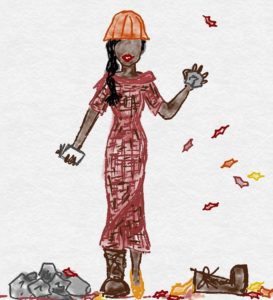
Early summer brings many of my favorite things. I get to visit the local nursery and spend way too much money on every annual flower that catches my eye. Lunches, dinners, cocktails, brunches, and even afternoon coffee take place outside on patios, piazzas, decks, and sidewalks. And sundresses and espadrilles are parts of a daily uniform.
But one of my absolute favorite early summer occurrences is the annual emergence of young, eager new male construction workers on all my jobsites. Wait – did I just say male workers? Is this going to be the start of a new, lecherous, politically incorrect phase in the life of Underpinnings? As interesting as that sounds (and lucrative), alas, the truth is much simpler and more wholesome.
Every year, young men everywhere graduate from high school and follow their fathers and uncles and grandfathers and mothers along a natural path into a wide variety of construction trades. These guys usually, if not always, are amazing examples of self-confidence and enthusiasm. They volunteer for every task. They say, “I can do that” with unabashed ease. They take pride in outlifting and outdigging and outworking everyone around them. And they eat everything in sight, constantly talking about and thinking about food.
(There might be some girls who enter the construction field when they graduate from high school, but I haven’t run into them on my jobsites. And I would bet that those few that are out there, somewhere, don’t have the ten-feet-tall-and-bulletproof attitude of their male counterparts).
Of course they have their obstacles. The older guys hide their tools. The jaded, experienced workers scoff at their swagger and interject a thousand cynical retorts for every ambitious proclamation. And the young guys’ inexperience and hubris often trips them up as they try to climb to the top in 20 seconds.
Regardless of their faults, I love these guys. I am in awe of their complete lack of angst. They don’t worry about letting anyone down. They don’t agonize about whether or not they can handle their jobs. They don’t overanalyze every co-worker’s words to determine if anyone is secretly disappointed in their performances or upset with them. And I think it goes without saying that any sane person would envy the ability to down three sausage egg biscuits and be hungry 30 minutes later.
Conversely, I have noticed that most women, when entering a new position or moving up into a new role, proceed at a much more cautious pace. We worry that we’re not smart enough or efficient enough or resourceful enough to do our jobs. The normally low buzz of panic and self-doubt that is the background music in our brains swells to a roar of incessant trepidation. Instead of being thrilled to have a new opportunity, we’re scared. We don’t need obstacles to crop up; we imagine them and spend all of our time dodging their looming specters in our brains.
The role of biology might have a partial role in this gender difference, particularly for women who are in male-dominated fields. We have the responsibility to nurture and protect our offspring, so we have to be a little less damn-the-torpedoes in our approach to life. We also have to be careful in a world where we’re typically smaller and weaker than the opposite sex.
My older brother would say that this natural caution is not natural at all, because he believes that there is no nature in the nature versus nurture debate, only nurture. His theory is that men and women would behave exactly the same if they were treated identically from birth. I don’t agree with him, but many people do. I believe that biology is part of the equation, but social development contributes as well. And maybe that’s where we can advance. A little bit of evolution in how we raise our daughters could produce a little less angst and a little more “I can do that!” We can do so many great things when we think about our jobs in terms of opportunity rather than potential failure.
My best friend (we’ll call her Environmental Girl, or EG for short) is a great example of how far a woman can go when she doesn’t hold herself back. A number of years ago, her company successfully bid on an environmental remediation project at an abandoned army airfield on an island in the middle of the Pacific Ocean populated only by endangered birds. (The blue footed booby frequently holds raves on the airstrip). The project would last several months, and the crew would travel to the island and stay there for the duration. No TV or radio, and hot coffee only when there was enough generator time available. EG said, “I want to go!”
This might seem bold, but it was particularly fearless given that her youngest daughter would be only 5 months old when the project would start. What??????
Many, many people said she was crazy. Her mother told her she was going straight to hell and she would need any profit from the job to pay for her infant daughter’s inevitable astronomical therapy costs when she got older. Female colleagues expressed shock and ran home to embrace their kids. But besides the fact that EG’s husband was a completely capable caregiver, as were her other 142 kids who all lived at home, the project only spanned a short time period. And it was a fabulous, once-in-a-lifetime opportunity! So she said yes, and she went. Damn more than the torpedoes – damn the whole fleet.
The experience was phenomenal, and EG learned things about herself she never would have otherwise. I am pleased to report that the endangered infant has grown into a daring chip off the adventurous old block, and she might be inclined to take on a project in the middle of the Pacific or take a position as chief of staff for the president of an international company and never doubt herself. When we doubt ourselves and hesitate to take chances and always put ourselves last, we teach our daughters to do the same. When we go after what we want and trust ourselves to be enough, we increase the chances that they will succeed.
Not every situation warrants a fearless attitude. Caution has its place. But self-confidence shouldn’t be an unknown quantity to women in the work world. We shouldn’t spend our time worrying about what we might do wrong, we should envision how high we can fly. Repeat after me – I can do that!
Are You a Feminist?
What Does That Even Mean?

Are you a feminist? What exactly does that mean? And is it important to you to identify yourself as such?
Megyn Kelly, former Fox News host and current NBC news personality, was widely derided in 2016 by her refusal to label herself as a feminist. She stated that the term had become divisive and had negative connotations. Many women took that position as a cop out and an avoidance of the true issue: that being branded a feminist would alienate many of the average Fox viewers. They said that she needed to stand up for women as a whole, even if it meant losing her job at Fox.
So what does the average bear think a feminist is? The simple answer (obviously) would be that a feminist is a person who believes that women are equal to men and should be accorded the same respect and opportunities. But, unfortunately, many years of history have colored individual perceptions. In addition, the actions and words of some in the heat of the battle on inequality have generated a decidedly negative vision of what a feminist represents and who she (or he) is.
Gloria Steinem no doubt was the trailblazer in the modern world of feminism, though not the original pioneer by a long shot. Elizabeth Cady Stanton and Susan B. Anthony were the Lewis and Clark of the equality wilderness, raising issues and bucking the norm long before Ms. magazine challenged the accepted role of women in U.S. society. Julia Ward Howe, Ida B. Wells, Sojourner Truth – these women functioned and rebelled in conditions we can’t even imagine. They made people face truths and answer questions that weren’t comfortable or conventional. Thanks to them, you’re sitting at your desk working on a tieback design or standing on a construction site yelling at people about clean bottoms.
Unfortunately, many of the men (and some of the women) of the times reacted to these women by assuming that since they didn’t want to fill a normal societal role, they didn’t want to be a “normal woman.” Translation: They didn’t like men and they didn’t want to be feminine. Although part of this was ignorance and part of it was an attempt at control through shaming, the ugly side effect was a lingering implication that feminists didn’t like being womanly and they were against men.
Organized feminist actions in the 1970s compounded this stereotype. The bra-burning, tie-wearing, loud, angry women that demonstrated for equal pay and equal opportunities reinforced the notion that feminists are rude, unfeminine, “coarse” ball-busters who don’t like men and have no interest in being nice to them. In fact, they want reparations for 12,000 years of oppression.
It’s often so easy to forget that people who start revolutions have to overcome years, decades, centuries of inertia. Society has been functioning as X, and now someone wants it to be Y. This doesn’t happen easily. It takes anger, it takes aggression, it takes breaking out of stereotypes just to get people’s attention. Changing the average person’s mind is another mountain to climb once you have their attention. It’s no wonder the early feminists seemed angry. They were trying to get people to listen! They were TIRED!!! They were exhausted from trying to overcome centuries of societal inertia. They were worn out from attempting to use logic to overcome fear and emotion. They were frustrated from worrying that they would be unsuccessful.
Despite the reason, the negative stereotype of a feminist still exists with many people. The purpose of all the hard work of Ms. Cady Stanton and Ms. Steinem and the others was to allow us all to be equal, regardless of who we are. They didn’t mean to support just women – they intended to establish equality for everyone. Purple, three-headed Martians would be accorded the same freedoms and rights as WASP males and women of east-central northern Irish descent who were born on the subway. But the residue of the battles remains, and the feminist brand often is not a positive one.
Some modern women, particularly those of a certain age, believe that to resist the feminist label is to abandon the cause. You are a failure if you don’t embrace the title and forge on with the battle. But are you? Do we shirk our duties as progressive women if we don’t deem ourselves warriors?
On a personal level, I have a serious problem with being given any label (except that of a University of Louisville Cardinal). Whether the label is true depends on how you define it. You might define it differently than I do. Beyond the definition, I might decide that I want to change in the future. The issue might change. DO NOT TELL ME WHO I AM.
I also don’t like the idea that being a feminist means tipping the scales against men. Equality means equality, not “We should get lots extra to make up for all that crap in the past.”
Here at Underpinnings, we have noticed an interesting development in this label issue. Younger women in our field are not as comfortable making a fuss about equality or their rights in the workplace, and they often aren’t ready to proclaim themselves feminists. In some cases, it’s because they don’t see their world as that bad. It’s not, because we’ve made progress. In other cases, they see us more seasoned professionals as being too confrontational and ready to raise hell. (See my previous comments on being exhausted from fighting the battle for so long). To them, the idea of being a feminist smacks of unnecessary and insensitive crusading.
In the case of Ms. Kelly, I believe that the whole point of feminism is to get us to the place where women can do what they want with their careers. When she was at Fox, she wanted to be at Fox. Was she wrong to monitor her language so as not to alienate the very audience she wanted to court? Yes, you say – she has an obligation to do what’s right for the advancement of all of us. Does she? Maybe the success of feminism is that she can express her opinion, whatever it is, and she gets to be the person to figure out what strategic moves she needs to make to have the career she wants. Whether that career is worthwhile is her business.
A necessary component of succeeding in war is unity. When the war is over, troops often have a difficult time establishing themselves as individuals, particularly if the issues from the war aren’t completely resolved. There is even fear of functioning outside of your unit, outside of the war. The need for determination and grit are so compelling during the battle that to give it up seems suicidal. Those women who fought the hardest of the wars of the past no doubt fear we will lose all the ground we’ve gained if we give up for even a second. They say that women are traitors who won’t go by the name “feminist,” lest we all end up back in the kitchen, illiterate with no freedom.
Perhaps we need a new word, one that represents our goal of equality for all, which was the original purpose. Allofusist? Everyoneist? Peopleist? We need to refocus on the fact that we celebrate women, not that we denigrate men. And we need to acknowledge that one of the spoils of this war was supposed to be our right to call ourselves whatever we want and carry out our personal and professional lives however we want. Ms. Kelly doesn’t have to call herself a feminist as far as I’m concerned. It won’t affect my ability to be what I want, which of course is a Cardinalist.
What Time Are You Leaving?
How to Avoid Killing Your Colleagues
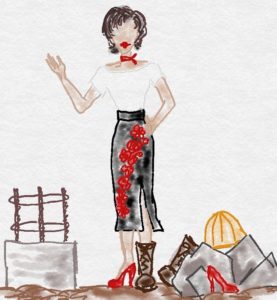
It’s Thursday afternoon at 3:50 PM. You’ve managed to end a phone call with a very talkative client who just happens to spend $3 trillion dollars with your firm every year. If you can make it out the door in the next 15 minutes, you’ll blow through the parkway before traffic gets bad, swing by the sitter to pick up the little kids, make it to the dry cleaner before they close, and have dinner on the table by 6:30, assuming the older kids didn’t eat the dinner ingredients when they got home from high school this afternoon. (Seriously – I can’t even count how many times I said over the years “You know where Kroger is. I suggest you get there and back VERY fast and replace what you just ate so the rest of us can have dinner. Who cooks ground beef as an after school snack?!”) If anyone delays you by even 10 minutes, you’ll sit in traffic for an eternity, have to pay a late fee at the sitter, the dry cleaners will be closed so you’ll have to wear your suit with the Gogurt stain on it for your big presentation tomorrow, and no one will eat dinner. Maybe ever. Are you getting tense just reading this? Did you check your watch? Drink some wine.
Back in our horror film scenario, just as you start to slip out your door, a familiar refrain can be heard from the next office door. “Leaving already? Wow. I never knew this was a bank.” Yes, it’s Carl. Carl is the engineer in the next office who has made it his life’s ambition to provide the public with a living history exhibit of a 1955 stereotypical male, cartoon-style. He sits down at his desk at 7:55 AM, he goes to lunch from noon to 1:00 PM at the same artery-clogging spot every day, he leaves at 5:05 PM, and he observes every little fragment of standard company protocol. He only knows that his kids wore diapers because he doesn’t trust his wife’s financial skills and checks over her purchases every week. He gets his oil changed every 3,000 miles because the manufacturer says to, and he enjoys halting construction projects so he can tell everyone involved that he’s “the engineer, and the engineer has the final word.” Carl is lucky no one has killed him.
Carl’s words burrow under your skin, even though this is the 3,712th time you have heard them. Seriously? Is he kidding? You haven’t slept in three years. You put in 60 hours last week, and a big chunk of it was when Carl was sleeping like a baby in his old man pajamas. You have an agreement with your boss. She said it was okay to leave now. She says your work is great. So why can’t you just shut the #$@% up, Carl?!
Actually, you mumble something about you wish it was a bank ha ha, and you sprint out the door. But Carl has ruined your afternoon. Again. And why? Does he really think you don’t belong here? Is he implying that your work is suffering because of your non-traditional hours? Is it suffering? Maybe the boss is just being nice. Maybe she’s been trying to find a way to tell you that you’re falling way behind. Maybe you never should have become an engineer. Maybe your kids and your husband think you’re a failure, too. Who were you kidding to think you could do all this?
(For the men in our audience, yes, this is how it really sounds in a woman’s head. It’s like a constant Hitchcock movie, in terms of tension).
On a calmer, saner note, let’s take a look at Carl. First, he’s an engineer, so chances are his personality really needs order and rules and consistency. Yours does, too, but there are ranges within every group. Carl happens to be at the psychotic end of the spectrum. In addition, who actually says something out loud to their co-worker about when she’s leaving, even if they’re speculating about it mentally? Is that Carl’s job? No. So that means that Carl is a meddlesome, arrogant, passive-aggressive control freak who constantly tries to compare others to himself so he can feel superior. In southern Indiana, they call that nibby. It’s not a good thing. So Carl is not such a great person, regardless of whether he’s a guy or a woman. Sexism is just one of the many negative attributes of his crappy personality.
Let’s go back to you. Do you have an agreement with your boss saying you can work this flexible schedule? Does she appear to be pleased with your work? Are you getting it done? Are you being sure to point out to your boss when you do things well so that it won’t get lost in the day-to-day fray? If the answers to these questions are yes, then what’s the problem?
Well, you say, the problem is that I’m sick of hearing Carl say these things, and I want him to leave me alone. As ideal as that may sound, life is truly just one long stretch of seventh grade. Carl has a personality problem, and it’s probably not going to change. And you’re going to work with a lot of other people who will have other personality problems, and they won’t change either. None of this has anything to do with your choices/position as a woman or as an engineer. This has everything to do with life being like seventh grade. The real lesson in life is learning to deal with the other seventh graders and developing enough confidence to believe in yourself.
It’s true, Carl is dreadfully annoying, as are the concrete guys who say every day, “Are you just getting up? I’ve been up since fill-in-the-blank.” These people have an insecurity and need to have a way to feel like they’re better than you. Just ignore Carl. No, he won’t go away. But you have lots of options to give it right back to him, if you choose to expend the energy. (If you do, be sure you are doing it for entertainment purposes only. You don’t need to lash out at Carl to prove your worth). You can say in your sweetest voice, “I KNOW! Isn’t it fabulous? I think I’ll go shopping!” Or you could send Carl e-mails every hour in the middle of the night, beginning each subsequent message with, “Well, I guess you’ve already gone to sleep. I’m glad someone gets to. Please try to respond whenever it is that you’ll be working again.” For a quieter offensive attack, you could just say, “Am I?” Is it?”
Carl’s sexism is just a symptom of his poor character, so don’t concentrate on the wrong disease. You won’t cure him with earnest talks about equality and opportunities.
For your part, you have to be very careful not to do the same thing Carl is doing. Maybe you think your job as a mom is very noble, and you comment to one of your friends that can you believe that new project manager gets to come in early on Fridays so he can leave at 2:00 PM to go backpacking every weekend? Here you are slaving away 23 hours a day, and this kid gets a flexible schedule so he can go play. No. You chose to have kids, just like he chooses to go backpacking. You can’t go getting outraged about others criticizing your choices and then attack someone else’s choices. It’s good for everyone or it’s good for no one. This isn’t The Handmaid’s Tale, and you aren’t being forced to breed. So tell that backpacker to send you some great photos of the Red River Gorge, and you’ll have your kids draw adorable sketches of mountains for him. Everyone will appreciate the variety of choice that is the spice of life, and you’ll all be in a better mood to get your work done. Except Carl. He’ll be too busy documenting for the boss how much time you and the backpacker spent talking, and he’ll make her a spreadsheet of lost productivity. Give your boss some of your wine – I guarantee you she needs it.
Toolbox Talk – The Dangers of Heat
Precautions for Heat Hazards
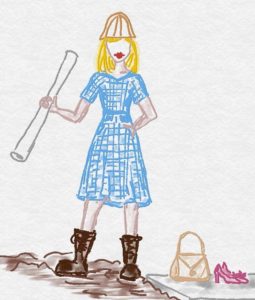
So, you did it. You slept with someone at work. Are you feeling liberated? Great. Hang onto that feeling, because it’s going to last for about another 14 seconds.
As women in a male-dominated field, we spend a lot of time talking about men who treat us badly or who make sexual remarks in the workplace. Obviously those situations are not desirable and they take away from the positive perceptions those around us have of our professional capabilities. But what happens when someone comes on to you and you accept? Isn’t it your right to decide how you respond to people in life? Didn’t a bunch of women in the 1960s and 1970s blaze a trail so that we could have the same sexual freedoms that men have? Maybe. But there is a yawning chasm of chaos between reality and idealism. It’s important to know the risks before you go rappelling.
In 1994, there was a watershed moment for the relationship between women and construction workers, and it involved diet Coke and a man named Lucky Vanous. There are a lot of women who still find meaning in the phrase, “It’s 11:30.” (If you don’t know what I’m talking about, do a YouTube search, but grab your drool towel before you start to watch). The idea that women could be the aggressor with a construction worker was revolutionary and went against the traditional stereotype.
For those of us in the industry, we were a bit amused at first, because the average construction worker is a little more Jack Black and a little less Chris Hemsworth. If you’re a 25-year-old female on a construction site, you absolutely can get 1,346 invitations and propositions a day (on average). Approximately 1,250 of those fall into the “Ewwww!” category, 52 are of the “Maybe if the world was about to end” variety, 31 can be summed up as “Yeah, IF YOU WEREN’T MARRIED,” 7 are cute but look like your brother, and 6 have potential. It’s those 6 that are dangerous. Three of the 6 are really hot and can be as deadly to your career as forgetting to design for lateral loads for a transmission tower next to a retirement home in Kansas. Someone is going to get squashed and someone is going to cry. Both might be you.
Let’s be clear – lots and lots of people find love at work. Lots of people find lust at work. Most women and men are aware of the pitfalls of lacing your latte with the company cream, so to speak. But sometimes it works, and sometimes that pair of big brown eyes you first see by the light of your oversized monitor will one day show up again on the face of your firstborn. HR will send a fruit basket and drink another double vodka, grateful that yet another potential lawsuit turned into a fairytale instead.
But you are not just another hexahedron in a cube farm with an adequate estrogen level. You are a female in a male-dominated industry, an X-chromosome in a sea of Ys. You struggle daily with getting the men around you to accept your intellect as equal to theirs. A huge part of your battle is getting those men to stop being distracted by the sexual part of your being. So what’s going to happen when someone finds out that the sexual part of your being is front and center at work?
The key to this discussion is realizing that most men (not all) will shift a woman into a mental category in order to perceive her as a competent colleague. Your older, wiser mentor? You occupy a “daughter” space in his mind. He’s so proud of you for being smart and dedicated, and he knows that a serious woman like you doesn’t trouble herself with sex. Or at least that’s what he tells himself so that his head doesn’t explode. Your fellow junior engineer who started at the firm when you did and weathered that ugly dam failure with you? He sees you as his “buddy,” sort of like his sister. He knows that you like boys, but he doesn’t want to think about it. Because the minute he thinks of you as someone who has sex, he can’t avoid thinking about that part of you when you’re working together. And then we’re back to distraction.
On a construction site, all of this is much more amplified. Despite the fact that this is 2017, construction sites still tend to be testosterone driven, with very traditional male roles and behaviors embraced as part of the culture. So the minute you walk out on the site, you are quarry to at least a portion of the men on the project. Some of the men will be convinced that you wouldn’t be out there if you didn’t want to have sex with all of them. Some will be appalled that a nice young lady like you is subjecting herself to such a rough environment every day. And some will be really cute. Just sayin’.
Your choice should be an informed one. This is not Fantasyland. Write that on your arm and repeat it to yourself often. Despite the fact that you should be able to go out with that adorable rodbuster and inspect his rebar if you so choose, there will be consequences. Some of the guys on the site will act disappointed in you. Others will take your actions as a free pass to make a pass. And still others will stop acting like you have any credibility. One piece of your being will eclipse all of the other parts for those men, and they will not be able to see all of the professional pieces they acknowledged before. It’s not fair, but it’s where we are. Two hundred years from now, 2017 will not be that time in history when life was equal for the sexes.
Your option for moving forward will be to keep doing your job and remind all of these men why they thought you were good at your profession to begin with. But this requires tenacity and a strong stomach. And you have to be committed to the cause. If you are sensitive or get upset easily when you are the center of attention, then don’t even go there. Look for your next squeeze at the smoothie bar or at your planned outing to the Renaissance Faire, and leave work at work.
Early in my career, I was working on a large construction site with hundreds of men. Two months in, I started hearing about the people I was sleeping with. It was very surprising, considering that I was working 80 hours a week and my social life consisted of watching the firefighters at the grocery on Sunday mornings. But the rumors persisted (and grew), despite my best efforts. One of the guys told me that no matter what I did to prove that I was a good engineer, I was still mostly a potential hookup to many of the guys out there. Finally fed up, I went in to our trailer at lunch one day and addressed what I was hearing. I told the guys that if they insisted on telling stories about me, at least make them interesting. I didn’t want it to be said I was having sex with one of the roofers, I wanted people to hear that I had sex with a roofer during the day shift on the roof. I told them whatever you do, don’t make me boring. Amazingly, the rumors stopped. Which only proved my theory that you have to have nerves of steel and the personality of a charging bull to weather this environment, even when you’re not doing anything. If you decide to actually do something, you’ll need to add a hide of heavy leather to that mix. It’s your decision, but you have to own it when you make it.
Maybe it will be better in 2073. Is it 11:30 yet? I’m thirsty.
Well Read
Booking an Adventure

I am a nerdy fan of any type of personality test. I love evaluations like Myers-Briggs, and I’m fascinated even by scientifically unsupported associations like astrology. We all know that psychology is a soft science, and the interpretations and nuances are never-ending. Plus, I am constantly intrigued by people.
To that end, I am obsessed with behavioral patterns and likes/dislikes that define people’s personalities. If you happen to land in a discussion with me and a group of people at a cocktail party, I almost certainly will ask you, “What’s your favorite movie?” or some similar question. I love to view people through their preferences.
One of my favorite questions is, “What do you read?” You don’t even need to be stuck with me over cocktails to be presented with this query. I might bump into you on the escalator at Macy’s and ask. Why? Because I love to read, and because an individual’s reading material is a window into not just their* soul, but into their situation in life. We read for so many reasons, to fill needs that are perennial as well as immediate. When someone tells me what they read, I learn two things. I understand more about their inner workings, and I get a possible lead on good reading material.
For me, reading most often balances the very very left brain environment of my daily work day. I read almost entirely fiction, unless it’s a cookbook or a gardening book. I currently am reading The Code Book, by Simon Singh, about the history of codes and ciphers, but this is very unusual. Don’t give me a biography, a discussion about the current economic/political climate, or anything scientific. I live that all day. And if you hand me any type of self-help book, I’ll assume you don’t want to be friends.
Over the years, I have noticed a number of trends in my reading, and they all mostly serve my intellectual and emotional needs. The protagonists in my books are usually female. Typically there is some form of romance, even if it’s incidental or a very small sub-plot. Often there is some type of scientific or fantastic angle. I hate books with jaded, bitter, or otherwise fundamentally negative protagonists. There are definitely books in my rotation that some might call fluff or trash. (My dad does). And the ending MUST be at least marginally happy. If someone is going to die or the world is going to turn dystopian, keep that nonsense to yourself.
One of my absolute favorite series, and some of my all-time favorite reads, are the Outlander books by Diana Gabaldon. Do I love these because they’re dramatic and one of the main characters is a 6-foot gorgeous Scot from the 1700s? Of course – do I look stupid? But I identify with these books mainly because I think Gabaldon has created one of the truly complete female characters in recent literature. Claire Fraser – nurse, then doctor, wife, counter-revolutionary, counselor, spy, advisor, mother – has been painted with a depth and a subtle feminism that is unusual even in current fiction. She goes about her medical duties with only the knowledge that she wants to heal people. She doesn’t get bogged down in whether a woman should be doing these things, even when others around her do, and she doesn’t make a crusade of it. Her character embraces adventure and doesn’t get whiny when she is uncomfortable. She is not afraid to show emotion, and she doesn’t feel diminished by the fact that she loves her husband so much that she willingly dramatically alters her life for him. She isn’t afraid to express her opinions, even when it makes a situation uncomfortable, but she is sensitive to the constraints and cultural limitations of people around her. I truly feel reinforced when I read these books because the heroine controls her own destiny.
Some books have proven to illustrate the perceptions of women in certain roles in our society, and I have read these as information on the thinking of people I deal with every day. Sara Paretsky, author of the V.I. Warshawski books, wrote into one of her novels a scene in which Warshawski, the private detective heroine, wanted to go unnoticed so she donned a hard hat and a clip board. I laughed for 20 minutes and then e-mailed the author and assured her the easiest way for a woman to be noticed is to wear a hard hat and carry a clip board. She actually responded and said she was surprised, but that just goes to show what the average person doesn’t know about being a woman in a field populated primarily by men. Amen, sister.
My search for new and interesting books that help me to fill in all those divots and blank spots in my life, for books that inspire me and those that give me hope, will not end until I can no longer read. I should mention that I also read piles of magazines, blogs, and a variety of other on-line publications. Thoughts and words are seeds that grow into beautiful and interesting actions and emotions. All of these sources help me to navigate the path that I’m following, and I know I am not alone in this practice.
So, here we are in this burgeoning online community of smart women and men who are the Underpinnings cocktail party. Before I go to refresh my pomegranate martini, you know what my inevitable question will be. What do you read?
(Author’s Note: Helen has assured me that the use of the singular “they” is now acceptable in mainstream publications and using he/she is awkward and passé. I feel very certain that Sister Mary Prisca Pfeffer would not agree and will rise from her grave and smite me. My death will be on Helen’s head).
Happy Holidays – Whatever That Means to You
Merry/Happy Something
It’s the end of December, and avoiding a holiday of some sort would be a difficult task. This is the time of year that emotions and social activity seem to hit a crescendo, sounding a tone that provides a soundtrack for our lives for at least a few weeks, if not more.
As the activities increase, often so do the responsibilities…and the expectations…and the preconceptions…and the guilt. We want to make sparkly shiny holidays to remember for our families, and we try either to overdevelop or hide these Martha Stewart-esque tendencies as we go about our professional lives. We entertain fantasies of moments under the mistletoe based on Hallmark Channel movies, (you can admit it – this is a safe space), while trying to maintain a tough, no-nonsense attitude on the jobsite. And we make donations to the Charleston Animal Protection Society by buying their annual Firefighter Calendar (FIREFIGHTERS WITH PUPPIES) while trying to pretend we’re really excited by the annual ASCE Bridges calendar (okay, maybe you are, but FIREFIGHTERS WITH PUPPIES).
The holidays don’t change the issues we deal with the rest of the year. We’re multi-faceted, interesting women who can’t be pigeonholed. The only way we can reinforce that idea is to share with each other all of our stories and special moments to affirm their importance.
We wish you a fabulous Christmas/Hanukkah/Kwanzaa/Winter Solstice/After-Christmas Shoe Sales, or whatever you’re celebrating. Good luck making a papier mache lobster head, or baking 4,000 cookies, or finding the perfect gift, or even getting your hands on a signed copy of the ASCE Bridges calendar. Let us know what fabulous things you’re doing – here are our versions:
Helen- Christmas is a Checkbox
Right now a lot of things in my life are a blur and get finished “just in time” or are deemed noncritical and shuffled to another list. If possible, this kicks into an even higher gear during the holidays. Christmas has always been one of my favorite times of the year, and was one of the reasons I wanted to have my wedding in late December. Now it is more than a little emotional since I got divorced last year.
At this time in my life I am in Mama Bear/Warrior Woman Mode, or MBWWM for short. I typically sleep 4-5 hours a night and then charge about the rest of the time from one thing to another, juggling two demanding part-time jobs, involvement in professional societies, three young children, multiple sports and activities for the older two kids, one Brownie troop, and a partridge in a pear tree. The days are long but the years are short, as they say. My life exists in lists: grocery (of course); long-term professional endeavors such as technical paper topics; what is due this week in school: homework, quizzes, pretzel money, basketball sign-ups, contribution to a class party, or the book fair; clients to reach out to for business development; and what we are planning for the next scout meeting, outing, or camping trip.
There are also the worries: are my kids eating healthy enough, brushing their teeth sufficiently, getting enough exercise, doing okay with the divorce, making the right friends, learning enough in school? Is it time to go through their clothes and sort things that don’t fit, give some toys away to charity or to younger cousins, or potty train the youngest? Am I progressing quickly enough in my professional career, is the specification I wrote sufficient for that project, will the contractor change the schedule yet again, and am I getting exposure inside my company and beyond it? These worries don’t stop because of the holidays- if anything they intensify for me.
I am not just playing Negative Nancy to Peggy’s Suzie Sunshine. The “before-children me” avidly followed Penn State football and Phillies baseball, loved having dinner parties and making breads and desserts, read books from numerous genres voraciously, loved hiking with my dogs on the weekends, binge-watched Buffy the Vampire Slayer, ER, and the X-files, and made plans to have drinks with friends bi-weekly. But right now I am the “single-mom with young children me” and much of that has been pushed aside while I have fully taken on this role.
But I am very fortunate to have met women through professional societies who report that there is a light at the end of the tunnel. Their children are grown and they are free to travel, work more, play hard, and rediscover themselves. An overwhelming majority of them are divorced as well, which I thought was interesting enough to point out, but I won’t speculate on this point today.
So, if all that is part of my “normal” life, what does it mean for the holidays? Aside from more lists: addresses for Christmas cards and gifts for the bus driver, teachers, the kids’ nanny, etc., it means instilling hope, love, and thankfulness in my children. I carry on the traditions of lighting an advent wreath at family dinner, cutting down our own Christmas tree, going to Christmas Eve mass, and leaving cookies and milk out for Santa. We have new traditions including making gingerbread houses, seeing a festive movie with the scouts, and doing good deeds with the help of our Kindness Elf (not Elf on the Shelf!). It also means stopping to appreciate the wonder that a 7, 5, and 2 year old experience on Christmas morning and expressing the gratitude that I feel toward my family and friends, and especially my parents, for the support they give me. Then I’ll cross Christmas off the list and move on to the next thing!
Peggy- It’s a Wonderful Life!
I grew up in a very close, Irish Catholic family, and we had more Christmas traditions than I could describe. In addition, I am a hopeless romantic, and the sparkly happiness of the holidays feeds right into my rather ridiculous love of all things sappy and festive.
Every year I hear and read endless comments/articles/doctoral theses about how difficult the holidays are and how tragic it is that everything is so commercial. But I tend to take the opposite stance. I love the holidays because there is more optimism, more kindness, more love than during the rest of the year. A pessimist would say it’s sad that people can’t be as kind and generous as they are during the holidays. I say isn’t it wonderful that people are better versions of themselves for part of the year? Doubters decry the commercialism of Christmas; I am happy that the holiday gives a number of people money to feed their families, and the constant commercials make some people take a moment to reach out to loved ones when they normally would not. Yes, I am Suzie Sunshine, and I’m not sorry. The guys on my construction sites get homemade cookies from me, and they’re not sorry either.
Many of my favorite things are holiday-related, because the season seems to act as an amplifier for emotions and reactions. My favorite date scene in a movie is the shopping/dinner date in the 1994 version of “Miracle on 34th Street.” My favorite dance scene in a movie is the Vera Ellen/Danny Kaye number at the club in Florida in “White Christmas.” My favorite shopping day of the year is my annual day at the mall in December with my mom and my little brother. And although it’s not my absolute favorite food, I absolutely love spending 5 or 6 hours making fruitcake in mid-November from my grandmother’s recipe and soaking the 12-pound cake in bourbon every week so the family can enjoy a little bit of family history at Christmas dinner.
It amazes me when clients ask for last minute drilling the week before Christmas, but I’m much less angry than I am when confronted with unreasonable requests the rest of the year. And sexist remarks have much less sting when Harry Connick Jr. is singing about Christmas Dreaming in the background. The happier I am, the stronger I am to take on those who don’t believe in me.
Even if you don’t live in my little glitter-filled, sugarplum-encrusted world, I hope you can find a way to experience some joy in the holidays (FIREFIGHTERS WITH PUPPIES). Every little bit of happiness makes you stronger, and there’s a lot of stray bliss lying around during the season.

